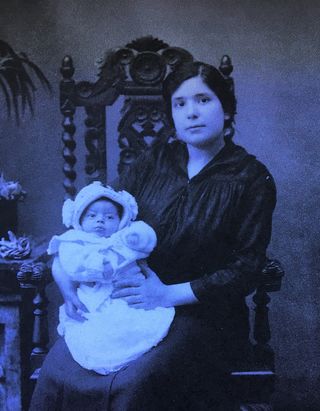Immigration and the Benefits of Other-Regarding Actions
We all have immigrant ancestors whose vision of America is worth fighting for.

Source: Mark O'Connell, LCSW-R
"Love your neighbor as yourself."
-The Holy Bible, Mark 12:31
About a century ago my great grandmother, Concetta, left her family in Sicily and set
sail for America. Her official certificate of registration (now on The American
Immigrant Wall of Honor at Ellis Island) states, that she joined, “those courageous men and women who came to this country in search of personal freedom, economic
opportunity and a future of hope for their families.”
Hope. For their families.
As soon as Concetta landed, she got married, gave birth to my grandmother, and not long after that her husband died. With very little more than the hope that motivated her initial journey, she managed to create an environment that would not only allow herself and my grandmother to survive, but would also nurture and encourage my grandmother to carry the baton even further in this land of opportunity.
By the time my grandmother became an adult and married my grandfather (whose parents were also Italian immigrants), their employment opportunities were still slim, but they were considerably greater than those of their parents. (My grandfather became a steelworker, and helped to build major buildings and bridges in New York City.) And what both of them had in spades was that same hope and belief in this country that fueled Concetta to cross the ocean to begin with, and to survive the abrupt and devastating loss of her husband. Like Concetta my grandparents were motivated by the possible future that America offered to the lives of their children and children’s children, even more than their own.
So it’s no wonder that their two daughters—my mother and aunt—not only carried the baton further, using the education system to advance their employment opportunities beyond the reach of the generations that preceded them. But also no accident that they both chose other-regarding professions: my mother was a school psychologist and my aunt a psychiatric nurse.
My mother met a kindred spirit in my father, as high school students in the Bronx. But this was not completely arbitrary either. My father was a descendant of immigrants from Ireland, who devoted the better part of their lives to their children’s futures in America. Having benefited from the education system himself, like my mother, my father also chose an other-regarding profession, becoming a history teacher, and later a high school principal.
Enter me. A boy who was told he could be anything he wanted. Who studied english and psychology, and then thought “hm, maybe I’d like to get an advanced degree in acting.” And then pursued acting as a career. And when that didn’t work out as planned, started his own theater company with the mission of expanding empathy and the ways we think about each other.
And from there I had the privilege of getting another graduate degree, which led to me become the therapist I am today, working with a variety of different people, each of whom is motivated by the dream for a better life in this country, for themselves, and for their families.
When I reflect on my life today—the privilege of opportunity and choice; the drive to create a better life not only for myself, but for other people—I think of Concetta. I think how wonderful it is that I am living her dream. Her vision of America. Which was not only to create a better life for oneself, and not only to provide more options for one’s children, but also to fertilize the rich land of freedom and opportunity for all. This idea strikes me now more than ever as my husband and I hope to adopt a child, who will carry the baton even further.
As studies have shown, “altruistic (other-regarding) emotions and behaviors are associated with greater well-being, health, and longevity.” So, to offer empathy and generosity to your fellow Americans, and those who wish to become U.S. citizens—in many cases to escape harm or certain death—is not at all at odds with the American ideal of individualism and personal gain. To take care of other people is indeed to take care of ourselves, and there is nothing more American than that.
Each of us has a Concetta somewhere in our family line, whose version of America continues to be worth fighting to preserve. As our country’s immigration system is in upheaval, it will do us well to reflect on her or him.

